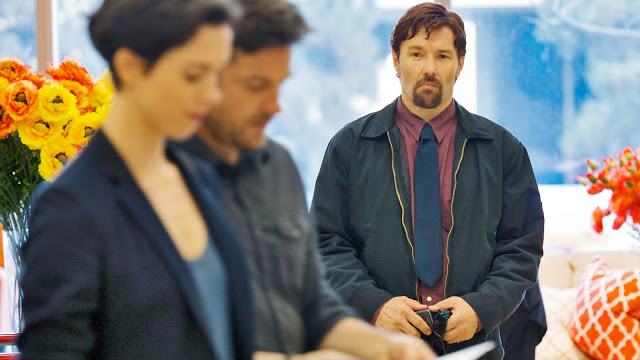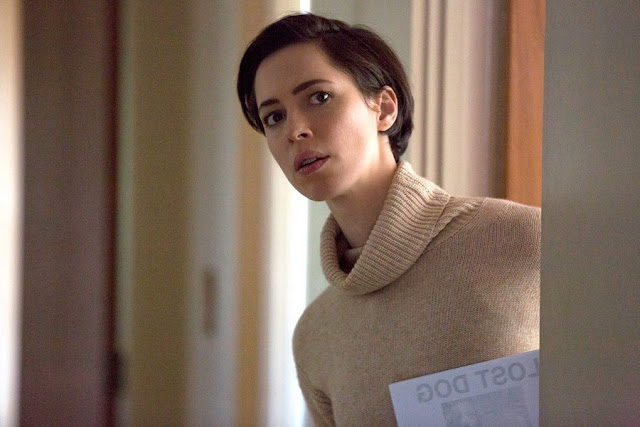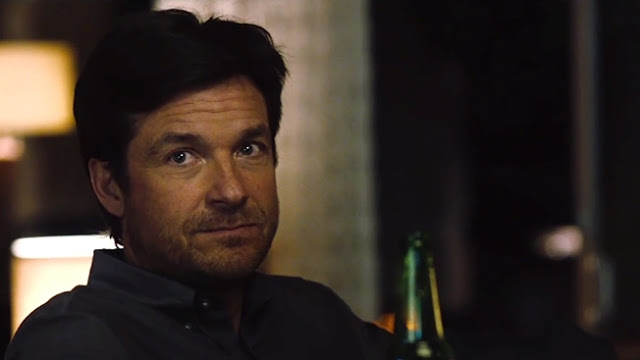In an early episode of Seinfeld called “The Male Unbonding,” Jerry finds himself trapped in an unwanted friendship with a childhood chum named Joel (Veep‘s Kevin Dunn), a selfish and fatuous oaf who fancies himself Jerry’s best bud. Eventually, Jerry can no longer bear Joel’s boorish behavior, and he attempts to “break up” with him; this leads to Joel blubbering in public, followed by Jerry swiftly backpedaling, then spending the remainder of the episode inventing excuses (choir practice! tutoring my nephew!) to avoid seeing him. In theory, this pattern of evasion continued indefinitely, but because Seinfeld was an episodic sitcom, Joel was never heard from again. Still, I’ve often wondered: What might have happened going forward between these two self-involved men? Would their asymmetrical friendship have faded naturally, with Joel gradually taking the hint? Or would something else—something more traumatic—have occurred?
The Gift, Joel Edgerton’s dark and disturbing thriller, plays like a twisted version of “The Male Unbonding”. It examines the process by which adults attempt to extricate themselves from undesired relationships, but it also refracts that process through a fun-house mirror. In “The Male Unbonding”, Jerry gamely suffers through Joel’s antics, repeatedly rolling his eyes, always accompanied by a chorus of laughter. In The Gift, the eye-rolls have given way to cold stares, and the laughter has been replaced by screams.
The movie begins with the Callens—the happily married couple of Robyn (Rebecca Hall, flaunting an Audrey Hepburn haircut and an American accent) and Simon (Jason Bateman, giving the performance of his career)—nestling into their swanky new Los Angeles home, the kind with glass exteriors and a koi pond. One day, while shopping for art-deco furniture, they’re approached by a hunched man who shuffles tentatively toward Simon and mumbles, “I think I know you.” This is Gordo (played by Edgerton, who also wrote the screenplay), and would you believe it, turns out he and Simon went to high school together. They exchange pleasantries, but the Callens have to skedaddle, and the conversation appears to be little more than one of those polite-but-forced encounters that people must stomach from time to time.
Not so much. A few days later, Gordo shows up unannounced at the Callens’ home, gifting Robyn a bottle of wine and offering to help around the house. Shortly after that, and without invitation, he’s filled that koi pond with fish. He persistently ingratiates himself to the point where, during one of his unannounced drop-bys, Robyn feels compelled to ask him to stay for dinner, and then he’s guzzling wine and telling tales of Simon’s high school exploits. “I’m very happy for you,” he tells Simon, an uncertain glint in his eyes—maybe envy, maybe something else. But Simon is less than pleased, and once Gordo hosts a dinner party with only the Callens in attendance, he decides to “rip off the band-aid” (yet another Seinfeld reference), telling Gordo gently but firmly that he’s no longer welcome in their lives. Gordo seems to take the blow in stride, but there’s still that glint in his eye to reconcile…
You can see where this is going. Or can you? Be patient; Edgerton certainly is. For a considerable time, The Gift positions itself as a typical terror film, with Gordo playing the part of the obsessed interloper and Robyn and Simon as his helpless, innocent targets. Edgerton is in no hurry to dissuade his audience from thinking otherwise. That’s why much of The Gift focuses on Robyn’s mounting paranoia, which Hall conveys with aching clarity, transforming a potentially rote role into a figure of enormous sympathy. Robyn is sweet, but she’s also scared, and with Edgerton behind the camera, it’s hard to blame her. This is his directorial debut, but he appears to have picked up some spooky tricks from his brother, Nash, whose The Square is one of the tautest thrillers of the present decade. (Nash actually supervised shooting here during Joel’s on-camera scenes.) Edgerton generates great mileage simply from observing the clean, antiseptic interiors of the Callens’ home, where every long hallway and shadowy alcove suggest a dark corner where Gordo might be lurking. Some of the scares are cheap, including one unforgettable “Boo!” moment (it’s really more of a “Bark!” moment), as well as a particularly unforgivable dream sequence. Most, however, are sustained, allowing Robyn’s dread to slowly seep into your bones. But what is truly scary about The Gift—and what elevates it above other thrillers of its ilk—is that, as menacing as Gordo seems, he isn’t the most disturbing person in the movie.
It is difficult to write about The Gift without spoiling its surprises or dulling its impact. Suffice it to say that Simon is not as innocent as he appears, which is where the brilliance of Bateman’s performance comes into play. The Arrested Development star is best known for playing the affable straight man, but over time—in Juno, in Bad Words, especially in Disconnect—he has gradually laced his nice-guy persona with undercurrents of darkness and contempt. When we first meet Simon, he seems pleasant, even charming, sketching a heart on a pane of glass in a tender display of spousal affection. But the more time we spend with him, the more he reveals himself to be a ruthless manipulator, selfishly maneuvering those around him, both in his marriage and his job. Edgerton evokes this shift in carefully calibrated stages, at one point featuring a breathtaking shot of Bateman bathed in dark red light, fury etched on his face, the camera cowering beneath him as if in fear. It’s an image that begs the question: Just who is the victim here, Simon, or Gordo?
While The Gift answers that question unexpectedly, its narrative is nevertheless oddly predictable, and I will admit that I forecasted a number of its reveals. This is not meant to be boastful, but merely to recognize that Edgerton is not overly preoccupied with shocking his audience with stunning twists. He is more interested in probing the concept of consequences, which is why The Gift methodically unspools as a dark fable of comeuppance. “You think you’re done with the past, but the past is not done with you,” Gordo tells Simon. That’s awfully ominous, but the ultimate meaning of Gordon’s words is less impactful than the doleful manner in which he says them, and the derisive way Simon receives them. As capable as Edgerton is in crafting a thriller, he’s equally adept at articulating the pride before the fall.
And there are quite a few falls. One might say The Gift is cruel toward its characters; it certainly inflicts upon them abundant pain. Yet the real victims of its mercilessness are the unsuspecting viewers who will waltz into the theater anticipating a boilerplate fright flick, instead of a sly and unsettling examination of how the past bleeds into the present. In upending those viewers’ expectations, Edgerton proves himself to be a blend of his two main male characters. Like Simon, he is without pity. And, like Gordo, he will have his revenge.
Jeremy Beck is the editor-in-chief of MovieManifesto. He watches more movies and television than he probably should.



